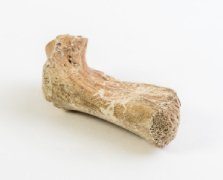Bones contaminated with polyvinyl acetate (PVA) require specialized pretreatment, such as solvent extractions, before radiocarbon dating. The success of the dating also varies if the bone has been soaked in PVA or if the PVA was applied in localized areas where there were cracks or breaks. If the bone has been soaked and saturated in PVA, there is usually little chance of successful carbon-14 dating.
 PVA is typically soluble in a number of organic solvents such as acetone, ethanol, benzene and toluene. As such, the pretreatment of PVA-covered bones would consist of physical abrasion to remove the outer surfaces of the bone, if possible, depending on the shape and size of the sample, followed by solvent extractions.
PVA is typically soluble in a number of organic solvents such as acetone, ethanol, benzene and toluene. As such, the pretreatment of PVA-covered bones would consist of physical abrasion to remove the outer surfaces of the bone, if possible, depending on the shape and size of the sample, followed by solvent extractions.
Many times conservators make “unique” mixtures of these adhesives which may contain something that the solvent extractions cannot remove. Thus, there is no perfect method for the pretreatment.
Beta Analytic offers high-quality radiocarbon dating of bones via Accelerator Mass Spectrometry (AMS). The cost per sample for bone samples contaminated with PVA is the AMS delivery service requested + Solvent Extractions + Collagen extractions. Beta’s AMS dating services are:
A few additional days in the quoted turn-around time might be necessary for difficult bone samples.
If the sample size permits, Beta also provides d13C measurement for all types of bones + d15N, %C, %N, and C:N (except cremated bones). The d13C and d15N ratios are measured using an isotope ratio mass spectrometer (IRMS).
More information on Beta’s services for bones, antler & teeth
Stable Isotope Analysis for bones also available NOT in conjunction with Carbon-14 Dating
 Quotations/Estimates – Please send information on the number of samples, service requested/turnaround time (AMS standard or priority), bone type (non-heated, fully charred or cremated bones) and the institution’s billing address using this form or email lab@radiocarbon.com.
Quotations/Estimates – Please send information on the number of samples, service requested/turnaround time (AMS standard or priority), bone type (non-heated, fully charred or cremated bones) and the institution’s billing address using this form or email lab@radiocarbon.com.
 Subscribe to Beta Analytic’s newsletter to receive company updates and upcoming webinars.
Subscribe to Beta Analytic’s newsletter to receive company updates and upcoming webinars.
This entry was posted on Wednesday, February 23rd, 2022 and is filed under Beta Analytic Updates, Radiocarbon Dating .